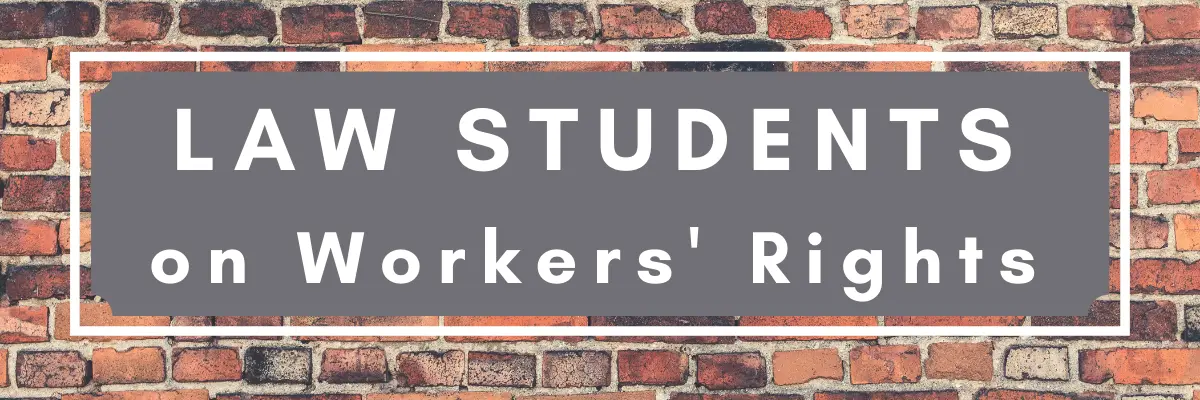
Fair Wages, Job Security, and the Corporate Bottom Line
July 8, 2020
Corporate Incentives Don’t Help Workers Get Ahead
By Donald Peters
Law Students on Workers’ Rights Series
The Law Students on Workers’ Rights series publishes essays from current and incoming students at some of the top law schools in the country. These essays, submitted for the Charles E. Joseph Employment Law Scholarship, address the question “What are the biggest challenges facing workers’ rights in the future?”
There are numerous challenges facing workers’ rights in the future, none more pressing than securing a fair and livable wage as well as job security. These two issues go hand in hand. With the globalization of work forces and the outsourcing that has become prevalent across almost all labor industries. As the cost of living rises, due to inflation and ever rising housing markets, many labor organizations and communities have fought for an increase in wages. However, as these wages were improved, many companies leveraged the increase in costs, that is employee wages, as excuses to ship their productions overseas.
In the fight to obtain a livable wage, employees are effectively pricing themselves out of work. This false dichotomy, of keeping your job but not earning enough or fighting for a fair wage and losing your job, is a narrative that benefits the companies, the owners, and severely hinders the advancement of workers’ rights.
Working to navigate this complex problem to best protect the jobs and pay for workers is not an easy solution and will require taking a broader perspective of the problem. This issue is not as simple as a worker versus company problem; the company cannot function without the workers, and the workers need the company for work. In an ideal scenario, the more successful the company, the more money that they make, the better off their workers will be. However, profit shares tend not to be as proportionally, and as the companies’ profits rise, they tend to increase their profits by cutting costs, which generally means finding labor that they do not have to pay as much for. Moving factories tends to be the most prominent way it is done; with companies seeking out bids from cities, and now countries, to determine where they can get the best tax rate and incentives, all the while paying the least they can for labor.
Public policies and laws, at the municipal, state, and federal level, have played a role in exacerbating this issue. The municipal and state laws weakening unions have significantly weakened the impact that labor has on providing a united front.
The Citizens United v. FEC Supreme Court ruling compounded this issue, as it allowed for increased financial donations, and thus the influence, of corporations on politicians. While correlation does not necessitate causation, in this case, the more money that a politician is able to raise, the more likely they are to be elected/re-elected. This allows corporations, which have access to far more financial resources than any individual or labor union, to have an undue influence on politicians, even though the corporations represent a minute percentage of the population. This influence allows corporations to support and secure the election of politicians that are sympathetic to the cause of the corporations over that of the laborers, providing incentives for those politicians to help support legislation that will benefit the corporations.
Freedom of speech is a paramount constitutional right and was the rationale behind the ruling in Citizens United v. FEC. However, it has shifted the weight of that voice from that of united citizens, large swaths of the population banding together and speaking on a united front, to those who have the deepest pockets. The more money that is spent, the louder the voice is.
With corporations have a significant say in legislation at all levels of government, and utilizing that power to develop and support a system where they can place wages and employment at odds with each other, the solution is far from simple. It will require a cohesive and concentrated effort at all three levels of government, and the diligence to persevere and fight, knowing it will be an uphill battle. Finding ways to empower and establish unions in locations where they have been dismantled or weakened. Models that stand out to me are the player associations for major league teams. These player unions have accomplished and secured major health changes, financial stability, and improved revenue splits with owners.
But finding ways to combat and solve the issues that led to the lack of living wages, and the reduction of employment opportunities is needed to ensure that laborers in the United States have their financial needs met and secured employment.
Reflections from Charles Joseph
When employment lawyers think about workers’ rights, they often start with workplace discrimination and retaliation protections. But as Donald Peters points out, workers’ rights also include the right to fair pay and job security. These broader notions, shaped by powerful forces like corporate incentives and political influence, connect with the law, as in the case of Citizens United. While fighting for workers’ rights in the workplace, we also have to consider the right to access to jobs and livable wages.
Donald Peters holds a bachelor’s degree from the University of Washington and a master’s degree from the University of Southern California. After teaching English at the middle school and high school level, he will join the University of Washington School of Law in fall 2020.
Charles Joseph has over two decades of experience as an NYC employment lawyer. He is the founder of Working Now and Then and the founding partner of Joseph and Kirschenbaum, a firm that has recovered over $140 million for clients.